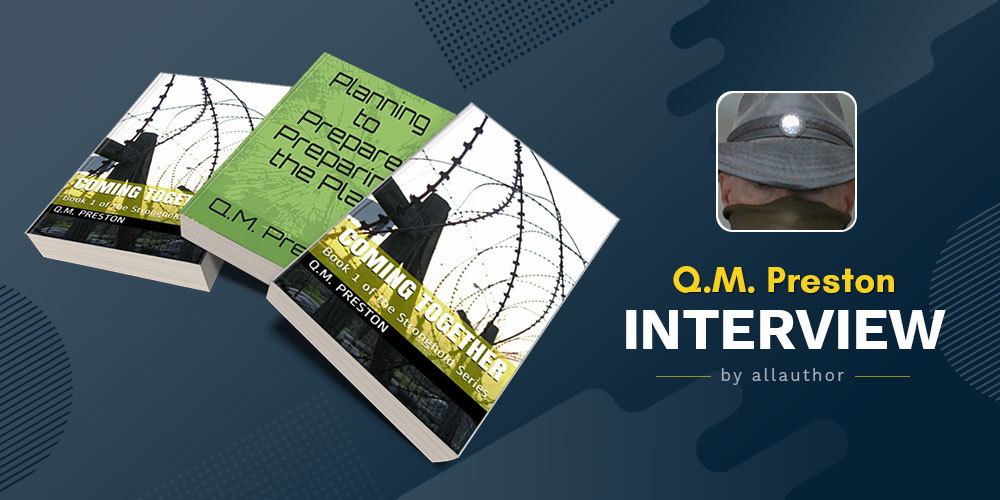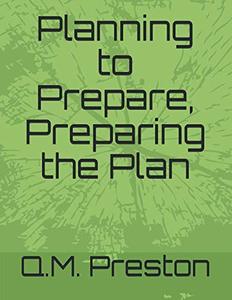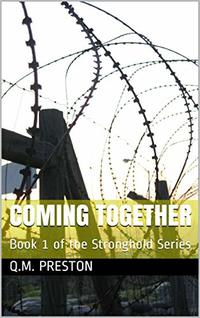Q.M. Preston Interview Published on: 25, Sep 2019
 Why did you choose Q.M. Preston as a pseudonym?
Why did you choose Q.M. Preston as a pseudonym?
I was struggling to find an appropriate pseudonym and decided to provide clues that family and friends might be able to use to guess that it’s truly me. I used clues from my military life and personal life to develop the name.
What was college like for you and how did it shape your writing?College life was relatively normal for me. I was primarily focused on my studies in Army ROTC and related activities. This helped provide a lot of the information that I use in my books.
How has twenty years of experience in the U.S. military in numerous roles helped you shape into a writer?Naturally, my military training and experiences provide a significant portion of the information that goes into my books. My experience also taught me important lessons in being thorough, striving for accuracy, and working until the job is done.
How much did you research to write "Coming Together"?The simplest answer is that I’ve researched a life-time for my books. I do very little research at the time of writing. Nearly all of what goes into my books comes from what I’ve learned over time.
According to you, what is the perfect recipe for an amazing story?An amazing story has to include the right balance of action, some adventure, humor, and realistic characters. I believe I’ve achieved success if a reader thinks to themselves, “Hey! I know that character!”
How do you come up with book titles? What is the significance of the title of your book, Planning to Prepare, Preparing the Plan?I try to develop titles that will spark interest in readers while giving clues to the story behind the title. For example, I call my series The Stronghold Series because it is about family and friends building a secure home. The individual titles in the stories tell the progression through the series.
With Planning to Prepare, Preparing the plan, I wanted to take a different track from the standard preparedness books. Instead of telling readers, “This is what you need to have on hand to be ready for this emergency,” I wanted to walk readers through the process of deciding what they needed to prepare for, determine what they already have, and then decide what they need based on their specific situations. As a result, it is more of a planning to prepare book than a preparing book. The reader plans out how they need to prepare and then prepares their plan from that point.
What is the most important thing to remember while writing a series? How do you tie the stories together?For me, the most important thing is consistency. Yes, characters should and will grow and change but they should still be consistent in what they do or how they are described. Also, consistency in events. For example, in Coming Together, certain characters took on specific responsibilities. I’m working very hard to make sure I don’t accidentally change that in the second book.
What inspired the plot of "Coming Together"? Do you find it more challenging to write the first book in a series or to write the subsequent novels?Coming Together is initially based very loosely on my family’s own emergency plans. I wanted a way to spell out the plan for the family while also presenting them with things that they would need to consider on a personal level. I wanted them to realize now some of the gut-wrenching decisions they may face in an actual emergency. I also wanted to provide readers with an entertaining story that taught lessons on how to survive emergencies without reading like an Army manual. There are plenty of manuals available. I don’t want my readers learning the specific steps of building a fire. I want to inspire them to ask questions such as “Would we need a fire?”, “Do we have what we need to build fires?”, and “Can we use an alternative to building a fire?”. Once they answer those questions, then they can find a manual on building a fire, or any other emergency topic.
For me, getting started with the second book has been more challenging than the first. For Coming Together, I basically already had an outline and just needed to add some dialogue and details. The book ended with the plan fully implemented. For the second book, I’ve really had to exercise my imagination. I asked myself, “So the emergency has happened and the family took action and is secure. What happens now?” That has been a challenge.
How do you think your books have helped young readers spark their imagination?I don’t really write my books intended for young readers specifically, but if a young reader does pick up my book, I hope it inspires them to consider the emergencies they may face in life and start working now to be ready for them. To me, in many ways, preparing for disasters is much like preparing for life in general. You need to be able to provide for yourself and your family while dealing with the unexpected. The unexpected could be a tornado, an erupting super volcano, or an unexpected job loss.
What is the one advice you would like to give to all the young writers out there?Don’t wait until you have your story perfected in your mind before you start writing. As soon as you get the idea, sit down and get started. You’ll find that your story will probably change as you write anyway. Fictional characters have a habit of doing things we don’t expect when we first start writing about them. Start writing and enjoy the wonderful surprises they will bring you.
Is there anything from the past you wish you could do differently? If yes, what is it?Everything in my past, the good and the bad, helped make me who I am today. The pain and mistakes taught me valuable lessons. Sometimes, I needed to be taught more than once but I think I finally got it. At least in some cases. So, I wouldn’t change anything about how my life has been. The only thing I would change is that I would have started writing Coming Together much, much earlier.
Are you working on anything at the present you would like to share with your readers about?I’m currently working on the second book of the Stronghold series. I’m behind my self-imposed schedule because I’ve had some things happening in my life but I’m happy to say that I am now fully back into writing. People have left reviews saying that they are eager for a second book and I don’t want to disappoint them. I think people will enjoy this next chapter in the story. There will be a lot more action, some higher level lessons, and a lot of character growth.
What has been your greatest accomplishment as an author? What are some of your future goals?I consider my greatest accomplishment to be when I saw reviews where the reader said that they thoroughly enjoyed the book and learned things they had not considered before reading it. That was the very definition of my goal when writing my book. My future goals include at least three more books in The Stronghold Series and branching out into doing some training. I would love to offer classes both in person and over the internet where I walk people through Planning to Prepare, Preparing the Plan and help them develop their own specific plans.
Describe your dream vacation.My dream vacation is easy to describe in just three words, in the woods. It can be in a cabin or a tent. In the mountains or in the backwoods of Mississippi. Getting out among the trees and animals helps me regain my sense of balance while giving me the opportunity to practice some of my skills.
When did you first join AllAuthor? Has this site been useful to you? Do you have any feedback?I first joined AllAuthor in April of this year, soon after publishing Coming Together. I was scouring the internet looking for ways to increase awareness of my book. I found AllAuthor and was very pleased with how the site is constructed and the services offered. I especially like how it brings readers and authors together. The site has been very useful. I think it has been a key factor in bringing me the success I’ve had.
Share Q.M. Preston's interview
Q.M. Preston used clues from my military life and personal life to develop the pseudonym. Naturally, his military training and experiences provide a significant portion of the information that goes into his books. According to him, an amazing story has to include the right balance of action, some adventure, humor, and realistic characters. He tries to develop titles that will spark interest in readers while giving clues to the story behind the title. For him, the most important thing is consistency.



